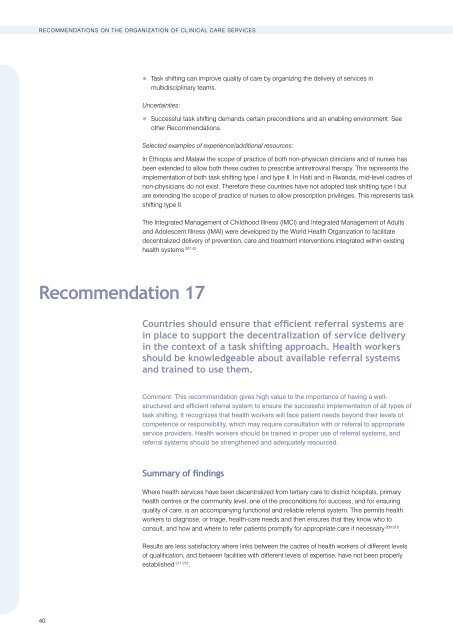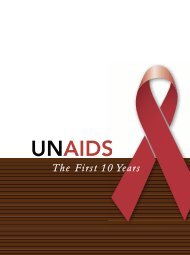Task Shifting - Global Recommendations and Guidelines - unaids
Task Shifting - Global Recommendations and Guidelines - unaids
Task Shifting - Global Recommendations and Guidelines - unaids
Create successful ePaper yourself
Turn your PDF publications into a flip-book with our unique Google optimized e-Paper software.
<strong>Recommendations</strong> on the organization of clinical care services<br />
• <strong>Task</strong> shifting can improve quality of care by organizing the delivery of services in<br />
multidisciplinary teams.<br />
Uncertainties:<br />
• Successful task shifting dem<strong>and</strong>s certain preconditions <strong>and</strong> an enabling environment. See<br />
other <strong>Recommendations</strong>.<br />
Selected examples of experience/additional resources:<br />
In Ethiopia <strong>and</strong> Malawi the scope of practice of both non-physician clinicians <strong>and</strong> of nurses has<br />
been extended to allow both these cadres to prescribe antiretroviral therapy. This represents the<br />
implementation of both task shifting type I <strong>and</strong> type II. In Haiti <strong>and</strong> in Rw<strong>and</strong>a, mid-level cadres of<br />
non-physicians do not exist. Therefore these countries have not adopted task shifting type I but<br />
are extending the scope of practice of nurses to allow prescription privileges. This represents task<br />
shifting type II.<br />
The Integrated Management of Childhood Illness (IMCI) <strong>and</strong> Integrated Management of Adults<br />
<strong>and</strong> Adolescent Illness (IMAI) were developed by the World Health Organization to facilitate<br />
decentralized delivery of prevention, care <strong>and</strong> treatment interventions integrated within existing<br />
health systems 207 42 .<br />
Recommendation 17<br />
Countries should ensure that efficient referral systems are<br />
in place to support the decentralization of service delivery<br />
in the context of a task shifting approach. Health workers<br />
should be knowledgeable about available referral systems<br />
<strong>and</strong> trained to use them.<br />
Comment: This recommendation gives high value to the importance of having a wellstructured<br />
<strong>and</strong> efficient referral system to ensure the successful implementation of all types of<br />
task shifting. It recognizes that health workers will face patient needs beyond their levels of<br />
competence or responsibility, which may require consultation with or referral to appropriate<br />
service providers. Health workers should be trained in proper use of referral systems, <strong>and</strong><br />
referral systems should be strengthened <strong>and</strong> adequately resourced.<br />
Summary of findings<br />
Where health services have been decentralized from tertiary care to district hospitals, primary<br />
health centres or the community level, one of the preconditions for success, <strong>and</strong> for ensuring<br />
quality of care, is an accompanying functional <strong>and</strong> reliable referral system. This permits health<br />
workers to diagnose, or triage, health-care needs <strong>and</strong> then ensures that they know who to<br />
consult, <strong>and</strong> how <strong>and</strong> where to refer patients promptly for appropriate care if necessary 208-210 .<br />
Results are less satisfactory where links between the cadres of health workers of different levels<br />
of qualification, <strong>and</strong> between facilities with different levels of expertise, have not been properly<br />
established 211 212 .<br />
40

















